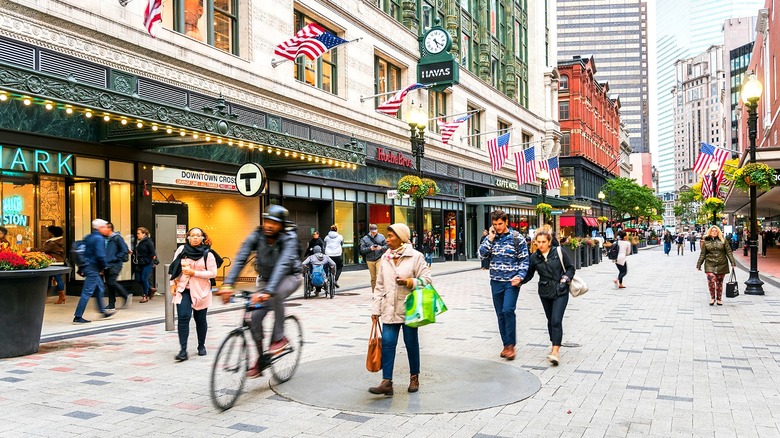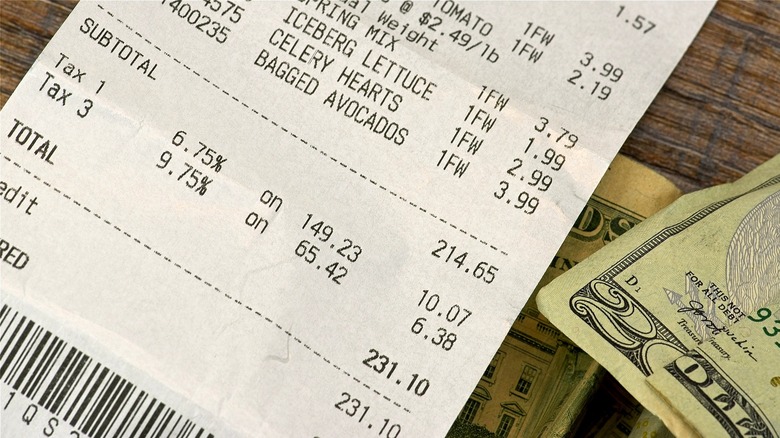You Don't Have To Pay Sales Tax In These States
There are five states in the United States where you don't have to pay a state sales tax on goods and services: Alaska, Delaware, Montana, New Hampshire, and Oregon. Among these five, Alaska is the only one that allows local governments to impose a local sales tax. While the other four states don't, there are a few special taxes where you may find yourself paying a tax for things like meals/rooms (New Hampshire) or prepared food (5% for Ashland, Oregon). But, as far as state-level sales taxes, these states have a state sales tax of 0.00%. Alaska and New Hampshire are also two of nine states that don't have a state income tax.
As for the state with the lowest state sales tax, it's Colorado at 2.9%. Unsurprisingly, California has the highest state sales tax at 7.25%, but it ranks eighth for the highest combined state and local sales tax rate at 8.851%. According to the Tax Foundation, the states with the highest combined state and local sales tax rates are Louisiana at 9.56%, followed by Tennessee at 9.55%, Arkansas at 9.45%, and Washington at 9.38%. As for Alaska, as the only no-sales-tax state that allows a local sales tax, its average combined sales tax rate is 1.821%, 46th in the country.
What is a sales tax?
For residents of 45 states and the District of Columbia, sales tax is a familiar line on most receipts. Calculated as a percentage of a purchase's total, sales tax adds a little more to every retail bill, except for certain items like groceries (though, even here, this is only the case for 37 states). In California, for example, where the base sales tax is 7.25%, that means a $10 book will cost $10.73, at least.
It's "at least," because only 32 of 482 Golden State cities have a 0.00% local sales tax. The highest combined state and local sales tax rate in California is 10.75%, meaning that book will cost $11.03 in Alameda, Albany, Hayward, Newark, San Leandro, and Union City; meanwhile, the book will cost $10.95 in Los Angeles (9.5%) and $10.86 in San Francisco (8.63%).
The origin of state sales taxes goes back to the 1930s and the Great Depression (learn how much a $10,000 bill from the Great Depression is worth today), and Mississippi was the first to adopt it as a supplemental revenue source. Today, sales tax comprises over 30% of a state's revenue, per the Tax Foundation. This money goes into a state's general fund to pay for things like schools, infrastructure, and public programs. When a state, like Alaska, Delaware, Montana, New Hampshire, and Oregon, doesn't have a base sales tax, it will make up the general-fund deficit through other taxes, such as property, corporate, and personal income tax.
States that tax groceries
While five states have no state sales tax, there are a few others that offer their residents and visitors comparatively low sales tax rates. Colorado, as noted, has the lowest base sales tax (that isn't zero) in the country at 2.9%, but Alabama, Georgia, Hawaii, New York, and Wyoming all have a state sales tax of only 4%. Note that Hawaii, though it's first among the most expensive states to live in, has a max local sales tax rate of 0.50%, making its average combined state and local sales tax only 4.44%, which ranks 40th in the nation, per the Tax Foundation.
This said, Hawaii does impose an excise tax on grocery stores, which ultimately gets passed on to consumers. In total, 13 states currently tax groceries — Alabama, Arkansas, Hawaii, Idaho, Illinois, Kansas, Mississippi, Missouri, Oklahoma, South Dakota, Tennessee, Utah, and Virginia — adding to the price of food at a time when food prices in the U.S. keep going up. According to the Bureau of Labor Statistics' Consumer Price Index summary for March 2024, the food index was up by 2.2% from the year before.
Grocery tax rates for these 13 states range from 0.125% in Arkansas to 7% in Mississippi. Idaho taxes groceries the same as its state sales tax, but it's also one of the states, along with Hawaii, that offers a grocery tax credit. That said, if it isn't zero, a sales tax still means you pay more for items than the sticker price, which can prove a significant budget consideration for many consumers.


